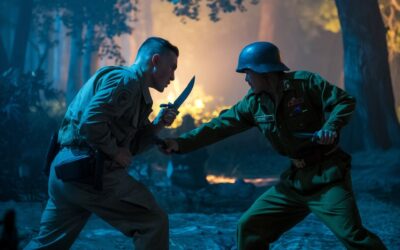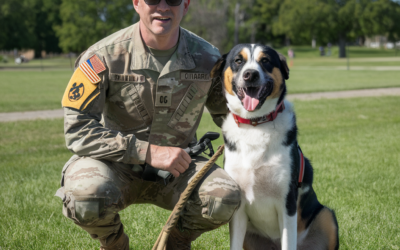“The ”self-image” is the key to human personality and human behavior. Change the self-image and you change the personality and the behavior.” Maxwell Maltz. author of Psycho-Cybernetics
Gradual personality changes can be normal with the aging process and experience that one receives. It is a part of human development. Psychologists generally view personality as one of the most stable and difficult-to-change human traits. But radical personality changes are seen in psychotic illnesses and organic brain damage. Sometimes exposure to traumatic combat experiences could cause acute changes in behavior and emotions. Many case studies coincide with the personality changes following traumatic combat exposure. These changes include confusion, delusional beliefs, altered awareness, violent behavior, detachment including withdrawal from family and friends, paranoid behavior, trigger events with vivid intrusive traumatic recollections, dissociative states and radical changes in lifestyle.
The Magnitude of Trauma and Personality Change – Research by K. Fink
The researcher K. Fink studied the correlation between Psychological trauma and possible personality changes. He postulates that, in post-traumatic personality structures caused by overwhelming traumatic experiences, pre-traumatic personality features and childhood experiences are of little or no relevance. In this study, sixty-four survivors of Nazi concentration camps were clinically interviewed and examined, their concentration camp experiences detailed and pre-persecution histories and post-persecution psychopathology studied. The significance of a concentration camp experience were analytically discussed and evaluated. This study showed that 52 cases (81.2%) of the 64 survivors of concentration camps presented an almost identical depressive personality structure irrespective of their pre-persecution life history. The 64 survivors of concentration camps were psychologically compared to 78 cases of people who, in view of the menacing circumstances, decided to emigrate and in this way were spared from becoming victims of the Nazi ‘final solution. (Fink,K. (2003) The Magnitude of Trauma and Personality change. Int J Psychoanal. 2003 Aug;84(Pt 4):985-95.)
Negative and Positive Personality changes following Combat Exposure
Combat trauma can cause drastic personality changes. Often these changes are negative. These negative changes are associated with pessimism, depressive feelings, anger, intense rage, lack of interest in libido (or sometimes the opposite: hypersexual behavior), extremism, inclination towards self-harm or suicide etc.
Regardless of the negative aspects of combat trauma, some studies indicate that there were positive changes after experiencing combat. There are many case studies on positive posttraumatic growth that helped a person to overcome his trauma and see the world in different perspective.
The story of the Emperor Ashoka (273 – 232 BC) is one of the best examples of positive personality changes following combat trauma. In his early days, the Emperor Ashoka had an undying desire to conquer. His last battle- the Kalinga War was full of human misery. He saw the death and dying of countless soldiers. He saw the human suffering. After the Kalinga War, the Emperor got a new insight. He renounced war and worked for the betterment of humankind embracing Buddhism. Ashoka in human history is often referred to as the emperor of all ages.
The Spanish novelist Miguel de Cervantes (1547-1616) returned from the Crusade as a tired soldier. He fought for Spain and when he returned to Madrid after slavery, he found out that the government ignored his services and did not pay any significant attention.  His mind was full of battle images and hallucinations. After coming home from long years of battle, Cervantes created the character Don Quixote
His mind was full of battle images and hallucinations. After coming home from long years of battle, Cervantes created the character Don Quixote that filled with humor and pathos. His fictional character Don Quixote goes in to dissociative episodes. He fights with windmills assuming it as enemy figures. Don Quixote’s vivid hallucinations reveal Cervantes tired mind after long years of battle. Cervantes once said, “The truth lies in a man’s dreams… perhaps in this unhappy world of ours whose madness is better than a foolish sanity.” Was Cervantes affected by combat stress? The answer could be yes.
The Count Leo Tolstoy participated in the Crimean War in 1854 fought against the French, British and Ottoman Empire to defend Sevastopol. He was exposed to numerous war traumas that changed his personality. The climax of this personality change occurred many years after the war when he was traveling to buy an estate. He had to stay in a motel and in the middle of the night, he woke up with a mortal fear. This could have been a severe anxiety attack and this incident made distinct changes in him.  He experienced persistent sorrow and emptiness, which he described in his autobiographical book Confession….
He experienced persistent sorrow and emptiness, which he described in his autobiographical book Confession….
"I cannot recall those years without horror, loathing, and heart-rending pain. I killed people in war, challenged men to duels with the purpose of killing them, and lost at cards; I squandered the fruits of the peasants’ toil and then had them executed; I was a fornicator and a cheat. Lying, stealing, promiscuity of every kind, drunkenness, violence, murder – there was not a crime I did not commit…Thus I lived for ten years.”
The posttraumatic growth in Leo Tolstoy helped him to become the best novelist of the World. His great epic novel the War and Peace deeply analyzes the war and human psyche ranging from heroism to cynicism and from glory to emptiness.
Even after many years, some of the personality changes troubled him. In January of 1903, as he wrote in his diary, Tolstoy had still experienced deep unshakable sadness.
"….I am now suffering the torments of hell: I am calling to mind all the infamies of my former life—these reminiscences do not pass away and they poison my existence. Generally, people regret that the individuality does not retain memory after death. What a happiness that it does not! What an anguish it would be if I remembered in this life all the evil, all that is painful to the conscience, committed by me in a previous life….What a happiness that reminiscences disappear with death and that there only remains consciousness…"
Mahatma Gandhi participated as a volunteer in the Ambulance Corps during the Boer war that fought from 1
 899 to 1902 between an alliance of the Boer governments and the Great Britain. In Boer war, Gandhi saw killings, torture and horrifying atrocities. This experience affected him greatly to embrace non-violence further deep. Gandhi was against any kind of War. He refused to support the revolutionary activities of Bhagat Singh and Subhas Chandra Bose who wanted an arms struggle to free India from the British. Gandhi once wrote: "I have nothing new to teach the world. Truth and non violence are as old as the hills. All I have done is to try experiments in both on as vast a scale as I could."
899 to 1902 between an alliance of the Boer governments and the Great Britain. In Boer war, Gandhi saw killings, torture and horrifying atrocities. This experience affected him greatly to embrace non-violence further deep. Gandhi was against any kind of War. He refused to support the revolutionary activities of Bhagat Singh and Subhas Chandra Bose who wanted an arms struggle to free India from the British. Gandhi once wrote: "I have nothing new to teach the world. Truth and non violence are as old as the hills. All I have done is to try experiments in both on as vast a scale as I could."
The Nobel Prize Laureate Ernest Hemingway served in the L incoln Brigade as a volunteer during the Spanish Civil War. According to the Military Psychiatrist Dr William Pike, half of the Spanish civil war veterans suffered from severe combat related stress. At one point, Dr Pike was able to take 28 shell-shocked men hiding in a wine cellar. Ernest Hemingway was disgusted with the war and its horrendous nature. This new experience inspired him to write his novel Farewell to Arms
incoln Brigade as a volunteer during the Spanish Civil War. According to the Military Psychiatrist Dr William Pike, half of the Spanish civil war veterans suffered from severe combat related stress. At one point, Dr Pike was able to take 28 shell-shocked men hiding in a wine cellar. Ernest Hemingway was disgusted with the war and its horrendous nature. This new experience inspired him to write his novel Farewell to Arms. In the later years, he suffered from recurrent depression and took his own life.
Personality Changes Following the Elam War Experiences
Many combatants who fought in the Elam War had experienced psychological disturbances. Some underwent acute stress reactions on the battlefield and some had late posttraumatic reactions. The chronic post-traumatic stress symptoms changed their cognition and behavior pattern. These psychological damages had long-term effects on the combatants. It affected their personal, professional and social lives.
Lt. HXX43 had served 9 years in the operational areas. In 1998 he was posted to protect the Jayasinha Pura Camp and there he underwent strenuous military duties and faced enemy fire. In 1999 when he was serving at the Kokkuthuduvai camp the LTTE attacked them. It was a dreadful battle and many people died. Lt. HXX43 witnessed the deaths of the enemy carders as well as the deaths of his own men. It was a shocking and devastating period for him. Over the years, he witnessed a number of deaths and how soldiers were getting wounded. At the Kovil Point in front of his eyes, a soldier lost his leg due to an antipersonnel mine. The soldier’s leg blown in to pieces all he could see was blood and bone fragments. These traumatic experiences changed this thinking pattern and made him more and more cynical.
After serving a number of years at the Northern war, front Lt. HXX43 came home as a tired man. Generalized body pain fatigue and frequent headaches often troubled him. He became more and more irritable and could not control his anger. He suffered a general apathy and could not feel happiness and did not derive any satisfaction by doing any pleasurable activates. His friends, parents and the wife noticed the melodramatic personality changes in him.
L/ Cpl. AXX39 served many years in the North facing hostilities. During this period, he witnessed a large number of combat related traumatic events. He saw the deaths of his unit’s soldiers as well as the enemy. He was utterly devastated following these sorrowful experiences. After coming home L/ Cpl. AXX39 became a different man. He physically and verbally abused his wife, often imposed heavy punishments on his children and became extremely suspicious. He lost the motivation and will to survive.
Personality Changes Following Traumatic Brain Injuries
A large numbers of soldiers sustained head injuries in the Elam War. These wounds were predominantly caused by the gunshots, mortar blasts and artillery attacks. Many injured soldiers had a range of neuropsychological problems and personality changes following the brain injuries. Apart from the personality changes these victims experienced impaired memory, difficulty in concentrating, cognitive difficulties especially in logic and in rational judgment with lack of impulse control.
Lance Cpl. NXXS32 sustained a MBI (Mortar Blast Injury) to the parietal region of the skull. He immediately lost his consciousness. Later he was transferred to the Anuradhapura Hospital then to the NSU (Nero Surgical Unit) National Hospital Colombo. After months of treatment, his physical condition improved.
Although he survived the MBI, the head injury gave him occasional epilepsy. He was then diagnosed with Posttraumatic Epilepsy. After the head injury, there were drastic personality changes in him. He had memory and cognitive problems, emotional liability with intense mood swings, hostility and inappropriate sexual behavior. He was treated with SSRI s, mood stabilizers, and CBT.
Sgt. CXXT56 served nearly 8 years in an artillery battery. There he was constantly exposed to artillery shellfire and vibration. By 2004, he had constant headaches, termers of the hands, sexual dysfunctions, inability to tolerate loud noises, hostile feelings, and marked cognitive changes.
Adopting Positive Stress Coping Methods
Personality traits play an important role in military training. Professor Joshua J. Jackson of the Washington University in St. Louis is of the view that the military attracts men who are generally less neurotic, less likely to worry, less likely to be concerned about seeking out novel experiences. Therefore positive stress management would increase the productivity of the military and it protects soldiers for great extent from possible psychological harm in combat situations.
Mismanagement of combat stress can lead to misconduct stress behaviors (insubordination, desertion, social disruption, and harassment of civilians) as well as negative stress coping methods like alcohol abuse, drug abuse, domestic violence and cruelty to children. The combatants must be taught positive stress coping methods such as seeking counselling services, meditation, engage in recreational activities, doing sports, participate in religious work etc. creative work like art , sculpture , writing also help to get away from stresses.
Private PX43 served in the operational areas over 8 years and throughout this period he witnessed death and destruction. He became restless, agitated and gradually experienced posttraumatic symptoms. His nights were full of battle dreams and horrors that he underwent in the North. When Private PX43 was referred for psychological support services in 2004, he was treated with medication and psychotherapy. In addition, he was referred for spiritual therapy that was consisted of Meditation. (Rev Harispattuwa Ariyawansalankara-Chief Incumbent, Sri Lanka International Vipassana Meditation Centre helped us enormously to organize meditation and spiritual therapy for the war affected combatants) Within several months, his mental condition improved and Private PX43 practiced meditation with a great interest. He became more positive about the life experiences and was able to overcome his posttraumatic features. By the late 2006, he was free of posttraumatic symptoms.
Cpl JX54 sustained a gunshot injury to his leg and underwent below knee amputation. His life was devastated after he became disabled. Several times, he planned to take his own life. He became hostile, blaming others for his misery and started abusing alcohol. In 2003, he was diagnosed with adjustment disorder and treated accordingly. Gradually his stress and anxiety reduced and he was able to see his present life condition with a positive attitude. Today Cpl JX54 is free of his traumatic and self-destructive behavior and engages in an income generating handloom business.
How PTSD Was Cured Four Times in 5 Hours
This case study shows how...
Can a Breakup Lead to Depression?
It is not the strongest...
How to Get Over the Death of a Service Dog like a Vietnam Veteran in 78 minutes.
This is an excerpt about...
The Power of Visualization: Lessons from Natan Sharansky, Arnold Schwarzenegger, and Michael Phelps
Visualization, the...
What Are PTSD Symptoms in Women?
Post-Traumatic Stress...
How to Cure PTSD Four Times in 5 Hours with Memory Reconsolidation Therapy
This case study shows how...
How PTSD Can Impact Women
Post-traumatic stress...
What’s the Best Way to Write a Breakup Letter?
Nobody likes breaking up,...
How Your Memories Affect Your Decision Making – Dr. Jordan Peterson
The purpose of memory is...









